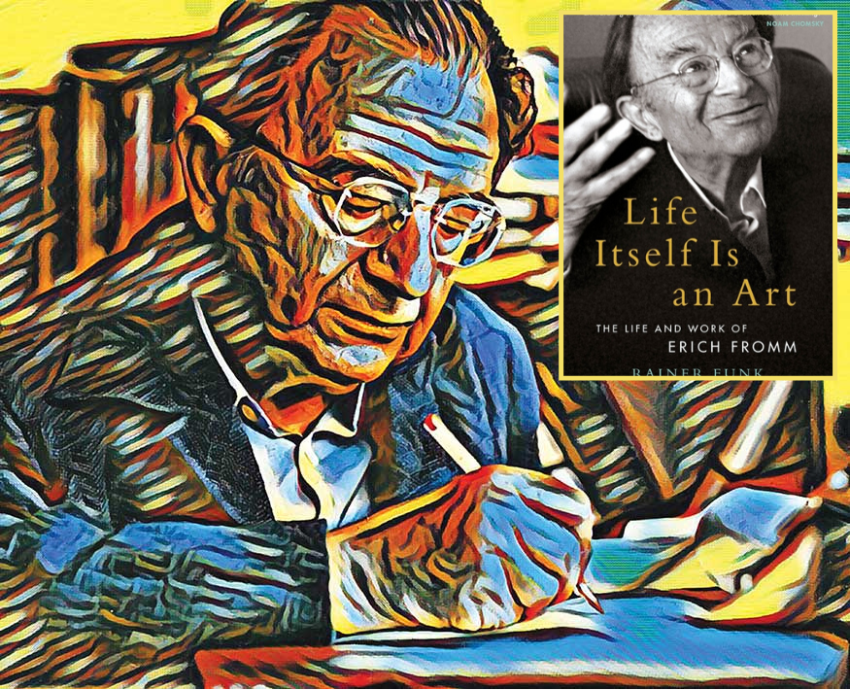
Life Itself is an Art: The life and work of Erich Fromm By Rainer Funk Bloomsbury, 2019, 194pp, $33.00
Erich Fromm, who died in 1980, was a high-profile member of the Jewish intellectual diaspora that washed up in the United States while fleeing for their lives from Nazi Germany. He was the author of 27 books in English (eight more in German), many of which were best-sellers and which introduced wide audiences to Marxism even during the 1950s McCarthyite anti-communist witch-hunts.
Like others in that migratory wave, such as Herbert Marcuse, Max Horkheimer and Theodor Adorno, Fromm was a member of the so-called Frankfurt School. The School – more properly the Institute for Social Research – was established in Frankfurt in 1929 and was a hotbed of progressive academic life.
The academy drew from Marxism, but also Freudianism, Hegelianism and other analytical approaches to create an interdisciplinary ferment. Fromm’s brief at the Institute was to integrate Freudian insights with social research in developing a sociopsychological methodology.
Over the years, Fromm took his distance from some of Freud’s instinct theories and developed a more radical analysis. For Fromm, an individual is always a social being and so libidinal drives (Freud’s favourites) could not be the be-all-and-end-all of human existence.
As he intellectually travelled on, Jewish scholarship, Marxism and Zen Buddhism were swirled together in his writings and his personal practice.
Fromm’s radical departure from prevailing theories of neuroticism was demonstrated in his 1941 book, Escape from Freedom. He pointed out that most psychiatrists “take the structure of their own society so much for granted that for them the person who is not well adapted assumes the stigma of being less valuable”.
The “well adapted” person may well have “given up his self in order to become more or less the person he believes he is meant to be”.
“On the other hand”, wrote Fromm, “the neurotic person can be characterised as somebody who was not ready to surrender completely in the battle for his self”.
He believed that the “inability to act spontaneously, to express what one genuinely feels and thinks, and the resulting necessity to present a pseudo self to others and oneself, are the root of the feeling of inferiority and weakness”.
Fromm believed the stigma of the label “neurotic” was unfounded. Individuals living in a society “adverse to human happiness and self-realisation” could only be expected to rebel and use various mechanisms to “overcome the unbearable state of powerlessness and aloneness”.
His life’s work was to theorise those mechanisms of escape, which are laid out in this biography.
Fromm disparaged capitalist consumerism: “There is no genuine strength in possession as such, neither of material property nor of mental qualities like emotions and thoughts,” he wrote.
A drawback to this book is the downplaying of Fromm’s Marxism. He was an outspoken and courageous Marxist in a time when it was dangerous to be so in the US.
In 1961, he published Marx's Concept of Man, which contains his translations and commentary of sections of Marx’s Economic and Philosophic Notebooks of 1844. Those writings were virtually unknown in the English-speaking world at the time and they exploded like a bombshell.
In opposition to the mainstream Marxism of his time, which was monolithic Stalinism, Fromm demonstrated that the origin of Marxism is the desire for human flourishing. That revelation also cut the ground out from beneath reactionary anti-socialism.
That life-fulfilling interpretation of Marxism, combined with Fromm’s critique of social conformism, contributed to the youthful anti-establishment political revolts that grew in the 1960s.
Erich Fromm was a champion of human liberation and this book is a worthy introduction to his life and work.